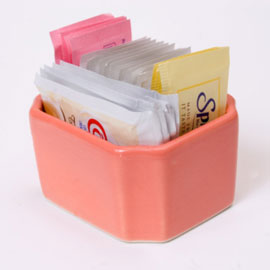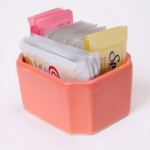 Are sweeteners healthy sugar alternatives or just trouble in a different package?
Are sweeteners healthy sugar alternatives or just trouble in a different package?
Pink, yellow and blue, their softly-colored packaging invites you to satisfy your sweet tooth without a single calorie. They’ve been touted by many as safe and enjoyable alternatives to sugar and criticized by others as potential causes of health problems from headaches to cancer.
But what’s the real story with artificial sweeteners? Are they valuable weight loss tools or dangerous parts of the modern diet that we don’t yet fully understand?
As a patient of gastric sleeve or lap band surgery in Salt Lake City, make no mistake—sugar is something to be avoided. Full of empty calories and known as a major contributor to the spread of obesity, sugary beverages in particular are facing mounting scrutiny from policymakers and the news media. This begs the question: can patients of weight loss surgery still get their fix of the sweet stuff by switching to a chemical alternative?
The Sweetener Debate
Though the $1.5 billion global industry of artificial sweeteners has long faced scientific scrutiny, opinions seem to be split down the middle. Some claim that sweeteners are safe; others claim that the neurological disorders and cancers they cause are simply being ignored. This makes assessing the medical realities of sweeteners difficult for consumers, who are constantly buffeted by hearsay and arguments from both sides.
The troubling fact is that we often don’t understand the role that certain elements of our diets play until long after they’ve been introduced. Trans fats are now universally recognized as unhealthy, but didn’t raise any red flags until the 1990’s, about 90 years after they first appeared. Though we do our best to understand how certain foods affect human health, it often takes decades to fully understand the implications.
Your Decision
This leaves the choice of whether or not to use artificial sweeteners up to you. The FDA identifies the three major sweeteners as “generally regarded as safe” and manufacturers base safety claims on the multitude of available scientific studies that show no evidence of sweetener toxicity. Many experts say that artificial sweeteners are useful tools for diabetic or overweight individuals who need to be careful about their sugar intake.
Yet concerns about sweetener risks still remain. Though there is no evidence of this in humans, sweeteners have shown a propensity for causing certain kinds of cancer in lab animals. Aspartame, which is found in Nutrasweet and Equal, may also cause some people to develop headaches and present a risk to individuals with a rare disorder called phenylketonuria (PKU) that makes them unable to metabolize phenylalanine.
Most experts agree that these are minor concerns. In a world that is rarely black and white, the potential problems caused by sweeteners may give us pause, but the very real problems of high sugar consumption and obesity are where we should focus our attention. With time, we may find that artificial sweeteners are just as unhealthy, and diet sodas certainly don’t offer any value. However, if artificially-sweetened products help you avoid the real thing, they are a more prudent choice by far.


